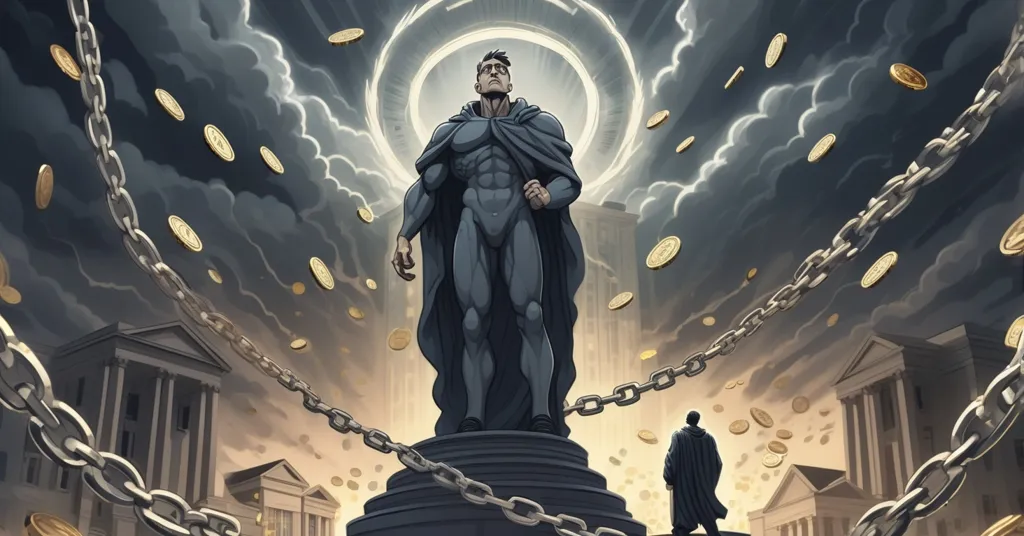Bitcoin Jesus Faces 109-Year Sentence in $48M Tax Evasion Battle with U.S. Extradition

Bitcoin Jesus Under Siege: Roger Ver Faces 109-Year Sentence in $48M Tax Extradition Fight
Roger Ver, dubbed “Bitcoin Jesus” for his pioneering role in spreading the gospel of cryptocurrency, finds himself in a legal quagmire that could define the future of financial freedom. Facing a staggering 109-year sentence in the U.S. for alleged tax evasion tied to a $48 million shortfall from a 2017 Bitcoin sale worth $240 million, Ver is now battling extradition from Spain to Los Angeles. His appeal to the European Court of Human Rights challenges the very notion of justice in a borderless digital economy, while the crypto community remains bitterly divided over his legacy. This isn’t just a personal fight—it’s a clash between state power and the ethos of decentralization.
- Tax Evasion Charges: U.S. prosecutors accuse Ver of evading $48 million in taxes via mail fraud and false returns from a massive 2017 Bitcoin sale.
- Extradition Standoff: Arrested in Spain, Ver contests extradition with a human rights lawsuit, claiming Spain’s approval is unjust.
- Community Fracture: From hero to villain, Ver’s past with Bitcoin Cash splits opinions—some defend him, others want him buried.
The $240M Bitcoin Sale: Where It All Went South
In 2017, as Bitcoin’s price skyrocketed, Roger Ver cashed out tens of thousands of BTC, netting around $240 million. It was a peak moment for crypto, but also a regulatory black hole. The U.S. Internal Revenue Service (IRS) had classified cryptocurrencies as property under a 2014 notice, meaning sales triggered capital gains taxes. Yet, detailed guidelines on reporting or enforcement were scarce, leaving many early adopters—including Ver—relying on patchy advice from accountants to navigate the maze. Prosecutors now claim Ver deliberately dodged over $48 million in taxes on this windfall, charging him with tax evasion, mail fraud, and filing false tax returns. The potential penalty? A jaw-dropping 109 years in prison, a term so long it feels less like justice and more like the government making an example out of a crypto poster boy. For deeper details on the charges, check out the specifics of Roger Ver’s tax accusations.
Let’s break this down for clarity. Tax evasion in the U.S. isn’t just about unpaid dues—it requires proof of intent to deceive, often paired with fraud charges that stack penalties. Add mail fraud (using communication channels to mislead) and false returns, and you’ve got a legal triple threat explaining that century-plus sentence. Ver’s defense, led by U.S. attorney David Schoen, counters that there was no malicious intent—just a good-faith effort to follow professional guidance in a time of legal uncertainty.
“He did not commit any crime. There was no intent to defraud. He followed the advice of professionals. That’s not a crime.” – David Schoen, Ver’s U.S. Attorney
Complicating matters is Ver’s relationship with U.S. jurisdiction. He renounced American citizenship in 2014, taking up residence in St. Kitts and Nevis, a move often associated with tax minimization. Yet, prosecutors argue he remained liable for U.S. taxes due to ownership of two American companies, MemoryDealers.com and Agilestar.com. Then there’s the “exit tax,” a punitive U.S. policy under Section 877A that targets wealthy expatriates—think net worth over $2 million—by taxing unrealized gains on global assets as if they’d sold everything upon leaving. It’s a financial sledgehammer, and in December 2024, Ver’s legal team moved to dismiss the charges, arguing this tax violates basic fairness and legal limits on taxation. For many in crypto, this reeks of a system designed to trap global entrepreneurs who dare to opt out. You can explore more about his background and legal history on Roger Ver’s detailed profile.
Extradition Battle: A Fight from Mallorca to Strasbourg
Fast forward to April 2024, when Ver’s world turned upside down. Arrested in Mallorca, Spain, on a U.S. indictment, he faced immediate extradition proceedings. Spanish authorities approved the handover, but after posting bail in May, Ver fought back, filing a lawsuit with the European Court of Human Rights in Strasbourg. His claim? Spain’s extradition order is a “denial of justice” and breaches international protocols, particularly under Europe’s strict human rights framework that can block extraditions if the accused faces inhumane treatment or disproportionate sentencing. For the latest on this legal battle, see updates on Ver’s fight against extradition.
For those unfamiliar, extradition is a legal process where one country surrenders a suspect to another for trial, often bound by treaties. In Europe, such decisions are scrutinized for human rights violations, and Ver’s case could hinge on whether a 109-year sentence for a non-violent crime is deemed excessive. There’s precedent—European courts have halted extraditions to the U.S. over concerns about harsh penalties or prison conditions. But the U.S. wields significant diplomatic clout, and Spain’s initial approval suggests political pressures at play. If Ver wins in Strasbourg, it could set a benchmark for protecting crypto figures from aggressive state pursuit. If he loses, the message is clear: no blockchain can shield you from Uncle Sam’s long arm. Learn more about the overarching case and potential sentencing in this report on Ver facing a 109-year sentence.
Community Divided: Savior or Saboteur?
Roger Ver wasn’t always a lightning rod. In Bitcoin’s infancy, he earned the “Bitcoin Jesus” title by pouring money into startups, promoting merchant adoption, and evangelizing decentralized money as a middle finger to centralized banking. His early investments and advocacy helped plant seeds for Bitcoin’s mainstream traction. But his legacy took a hit during the 2017 hard fork that birthed Bitcoin Cash (BCH). For context, this split was rooted in a fierce debate over scalability—how to make Bitcoin handle more transactions without choking on fees or delays. Ver backed BCH’s push for larger blocks to enable faster, cheaper payments, clashing with Bitcoin Core developers who prioritized off-chain solutions like the Lightning Network. Community reactions to this split are widely discussed on platforms like Reddit, where opinions on Ver’s role in Bitcoin Cash vary.
This wasn’t just a technical disagreement; it was ideological warfare. Critics like Dan Held, a former Kraken executive, blame Ver for distorting Bitcoin’s vision so badly it sparked a “civil war,” fracturing the community into rival camps.
“He misaligned expectations around Bitcoin so much that it led to a civil war. He deserves everything that he’s about to get.” – Dan Held, via X
Elon Musk, never shy with a hot take, also piled on, dismissing any notion of a pardon with a jab at Ver’s citizenship dodge.
“Roger Ver gave up his U.S. citizenship. No pardon for Ver. Membership has its privileges.” – Elon Musk, via X
Yet, Ver has defenders who see him as a scapegoat for state overreach. Ross Ulbricht, the recently pardoned Silk Road founder, credits Ver for past support during his own legal hell and argues no one should face life in prison over taxes.
“Roger Ver was there for me when I was down and needed help. Now Roger needs our support. No one should spend the rest of their life in prison over taxes. Let him pay the tax (if any) and be done with it.” – Ross Ulbricht, via X
Ethereum co-founder Vitalik Buterin has called the U.S. exit tax “extreme” and the charges politically motivated, echoing a broader fear among crypto pioneers of being hunted for innovating in uncharted territory. Even online forums like r/btc frame Ver as a guardian of Satoshi Nakamoto’s vision for peer-to-peer cash, disputing narratives that pin BCH’s creation solely on him. While Bitcoin remains the gold standard for decentralization in my view, forks like BCH do test niche solutions—whether we like the drama or not. Discussions on trust and perception of Ver are also prevalent on platforms like Quora regarding his influence in crypto.
Crypto Tax Chaos: A System Lagging Behind Innovation
Peel back the layers of Ver’s case, and you’ll find a deeper systemic rot. In 2017, when he sold his Bitcoin stash, the IRS offered little more than a vague 2014 notice treating crypto as property. No clear rules on reporting, no robust enforcement—just a regulatory shrug as the market exploded. Many early investors, Ver included, leaned on advisors to interpret this gray area, often with disastrous results when the taxman came knocking later. Fast forward to today, and U.S. crypto tax policy has tightened considerably. The 2021 Infrastructure Bill mandated broker reporting for digital assets, while high-profile IRS crackdowns on exchanges like Coinbase show a government hell-bent on catching up. For insight into broader crypto tax enforcement trends, look at legal precedents in crypto tax evasion cases.
Ver’s predicament highlights a brutal truth: retroactive enforcement feels like a betrayal to those who built the crypto space before the rulebook existed. If you’re a newcomer, imagine inventing a new kind of car, only to be fined years later for not meeting safety standards that didn’t exist when you built it. That’s the bind early adopters faced. And while I’m a Bitcoin maximalist at heart, championing its purity as sound money, I can’t ignore how this regulatory lag has hurt innovators across the board, from Ethereum developers to altcoin creators filling gaps Bitcoin doesn’t address.
Political Play: Lobbying and Pleas for Mercy
Ver isn’t just fighting in court; he’s playing the political game too. Reports indicate he paid $600,000 to Trump ally Roger Stone to lobby Congress over the laws tied to his charges. In a direct video appeal on X, Ver pleaded to Donald Trump, framing himself as a victim of relentless persecution.
“For decades, I’ve been terrorized by rogue U.S. government agents who hate American freedom. This is my story.” – Roger Ver, via X video appeal to Donald Trump
With Trump’s recent pardon of Ulbricht and growing crypto-friendly vibes in some political circles, speculation swirls about whether Ver could snag a similar reprieve. Musk’s sharp “no pardon” stance suggests otherwise, but the intersection of crypto and U.S. politics is heating up. Ver’s case could become a flashpoint—will a pro-Bitcoin administration soften the blow, or will hardline tax enforcement prevail? Either way, it’s a reminder that decentralization doesn’t just disrupt finance; it rattles power structures at every level. For more community perspectives on his controversial status, see Reddit threads debating Roger Ver’s reputation.
Bigger Picture: Crypto’s War with State Power
Step back, and Ver’s saga isn’t just about unpaid taxes or a polarizing figure. It’s a microcosm of crypto’s core struggle: individual sovereignty versus state control. If Ver is extradited and convicted, the ripple effects could chill innovation. Entrepreneurs might think twice before engaging with jurisdictions like the U.S., fearing retroactive penalties for decisions made in a once-ambiguous landscape. Why build the future of money if you’re just a tax audit away from a life sentence? Harsh extradition precedents could drive talent and capital offshore, fragmenting the industry further.
Then there’s the irony of blockchain itself. Bitcoin’s transparency—every transaction etched in a public ledger—makes wealth traceable, complicating tax avoidance even for the privacy-obsessed. If even Bitcoin Jesus can’t escape the taxman’s gaze, does true financial freedom exist on a transparent chain? Playing devil’s advocate, one might ask: if renouncing citizenship to sidestep taxes isn’t a slap in the face to any system, what is? Shouldn’t pioneers play by some rules, even flawed ones? My rebuttal, as a champion of decentralization, is simple: when those rules are a moving target, crafted to crush disruption, opting out isn’t rebellion—it’s survival.
Let’s not sugarcoat it—a 109-year sentence for a non-violent offense is absurd, longer than Bitcoin’s entire existence. Talk about holding a grudge. Meanwhile, violent criminals often walk free sooner. But Ver’s critics aren’t wrong to highlight the optics of ditching citizenship while allegedly dodging dues. It’s a messy, ugly fight, much like the man’s own legacy.
Final Thoughts: A Trial Beyond One Man
Whether Roger Ver walks free or faces a century in chains, his battle lays bare the fault lines of our decentralized dream. Government claws don’t retract easily, and even the staunchest Bitcoin maximalists must wrestle with the real-world fallout of challenging entrenched power. As this legal drama unfolds across continents, it’s not just Ver on trial—it’s the very promise of financial sovereignty in an era of unyielding state dominance. So, as you mull over the latest Bitcoin block or altcoin experiment, ponder this quietly: is crypto’s vision of freedom worth the personal cost when the empire strikes back?
Key Takeaways and Questions for Crypto Enthusiasts
- What are the specific charges against Roger Ver, and why such a severe 109-year sentence?
Ver faces U.S. charges of tax evasion, mail fraud, and filing false returns over a $48 million shortfall from a 2017 Bitcoin sale worth $240 million. The extreme sentence reflects stacked penalties across multiple charges, signaling a potential intent to make an example of him. - How does renouncing U.S. citizenship affect Ver’s tax obligations?
Despite renouncing citizenship in 2014 for St. Kitts and Nevis, prosecutors argue Ver owed taxes due to U.S. business ties and the “exit tax,” which taxes wealthy expatriates on global assets as if sold upon leaving. - Why is the crypto community so split over Ver’s situation?
Supporters like Ross Ulbricht and Vitalik Buterin view him as a target of state overreach, while critics like Elon Musk and Dan Held condemn his role in Bitcoin’s 2017 split into Bitcoin Cash, seeing him as a divisive force. - What does this reveal about U.S. crypto tax policies in 2017?
It exposes a regulatory gray area—crypto was treated as property by the IRS, but without clear reporting rules, leaving investors like Ver vulnerable to legal risks even when seeking professional advice. - How has crypto tax enforcement evolved since Ver’s 2017 sale?
Post-2017, policies tightened with measures like the 2021 Infrastructure Bill mandating broker reporting and IRS crackdowns on exchanges, a stark contrast to the earlier ambiguity that trapped early adopters. - What precedent could Ver’s extradition set for Bitcoin investors?
A conviction could deter crypto innovators from engaging with aggressive jurisdictions like the U.S., pushing talent offshore and raising fears of retroactive penalties for past regulatory gaps. - Does blockchain transparency undermine financial freedom in cases like this?
Bitcoin’s public ledger makes wealth traceable, complicating tax avoidance and clashing with privacy ideals—raising questions about whether true sovereignty is possible on transparent chains.



